Mean Streets of Zagreb, Croatia – Most Corrupt Nation in The World
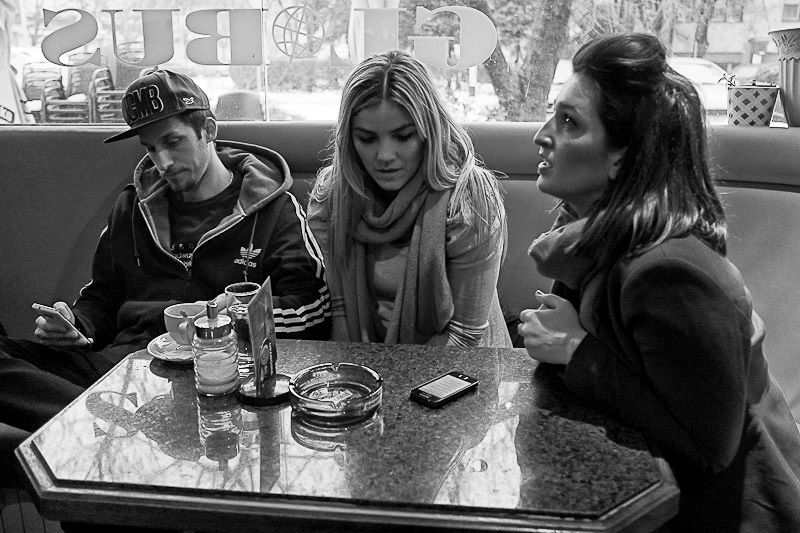
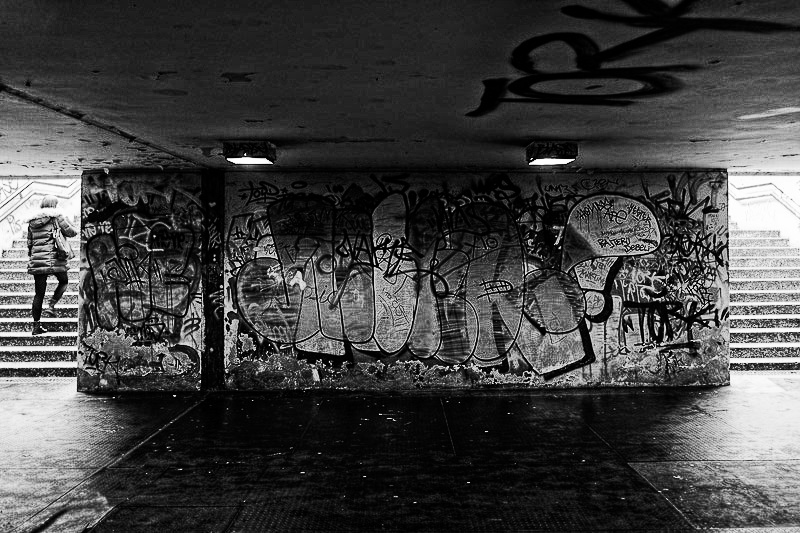
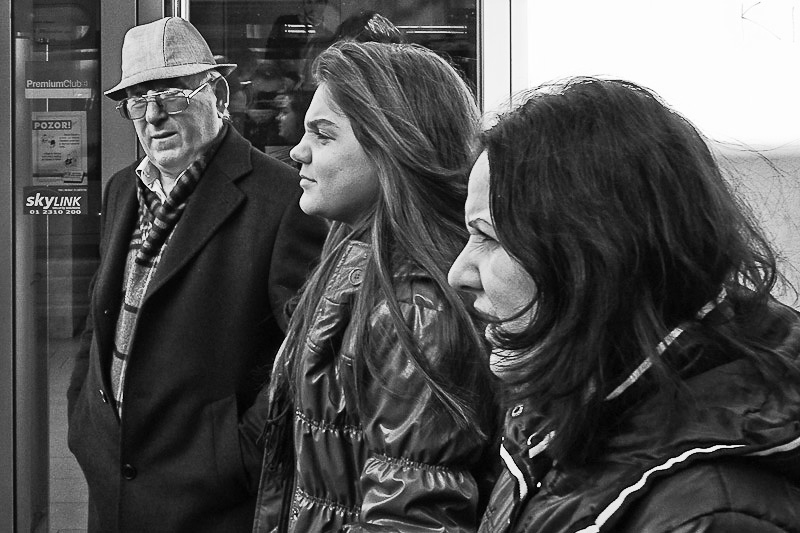
“Croatia is the most corrupt nation in the World”. He was the second person to have told me that, in just a few days. First, it was the owner of a local restaurant, who over the course of an evening barraged me with stories including the former truck driver who smuggled rapidly depreciating stolen Croatian currency across the border – on behalf of a government official – exchanging it for much more financially stable German Deutsche Marks.
The truck driver had been rewarded for his good work, and was now the owner of a large factory in Switzerland. Another who serviced the powers that be, had become a General – despite a total lack of any military experience. But, it was the second gentleman I met who spoke of Croatian corruption, that had the biggest impact on my understanding of what Croatia has, and is, going through.
“This man asked me if I had any hidden microphones in my office.” It had been twenty minutes since the story began to be told. Although it was reaching the crux, he had ensured I understood the intricacies of his tale of “mishandled privatisation” – a concept familiar to most post-communist nations. “He wanted me to sign my name, on a blank contract”.
In charge of a large public owned “concern”, the carrot for the shadowy guest was the land that the enterprise occupied – prime downtown Zagreb real-estate. A large sum of money – more than 6 but less than 7 figures, in Euro dollars, was being offered in return for a signed, blank, contract. This would lead to a change in ownership of the valuable property.
“I told him that my office door has two handles. One to enter, the other for leaving. And that he should leave, and never come back.” At that point of the story, I assumed this wasn’t the accepted way to play the game, not with such powerful and connected individuals. Refusing a large sum of money, with likely impunity, was not a regular occurrence.
“Soon after, I received word that the company was officially declared bankrupt. I had to tell more than 200 people, they no longer had a job. It’s not just 200 people, it’s their families as well. We shut down.” He retired, that was his last job. He mentioned he wasn’t rich, and joked that he was now waiting to die, to be buried in the cemetery on the hill behind us.
The whole time he was telling me this story, his wife was standing by his side, occasionally helping out with English. “He doesn’t cry about it any more”. Ironically, he had wiped tears from his eyes multiple times while telling me this complicated and yet straightforward example of corruption, or “mishandled privatisation”. It’s an unfortunately familiar story – greedy people, stealing from their fellow citizens.
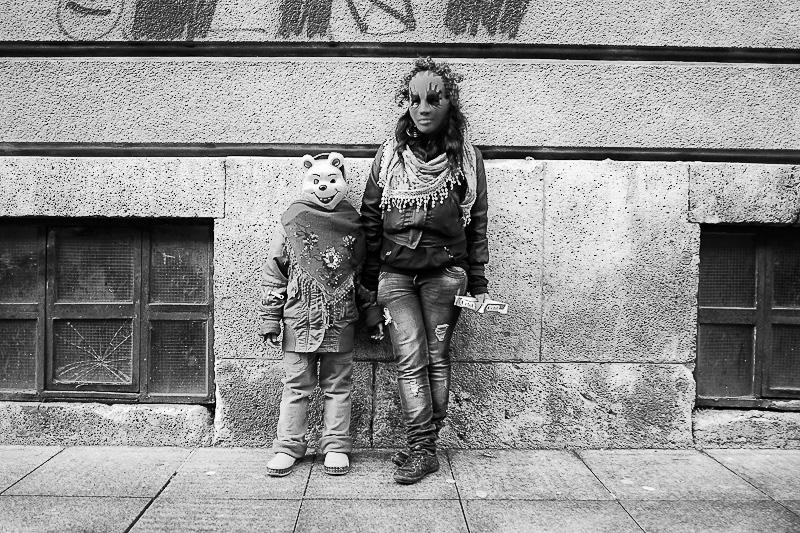
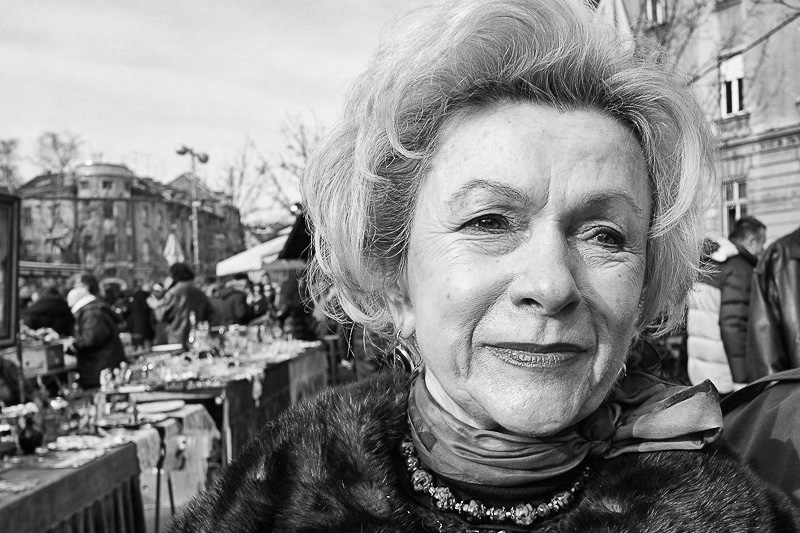
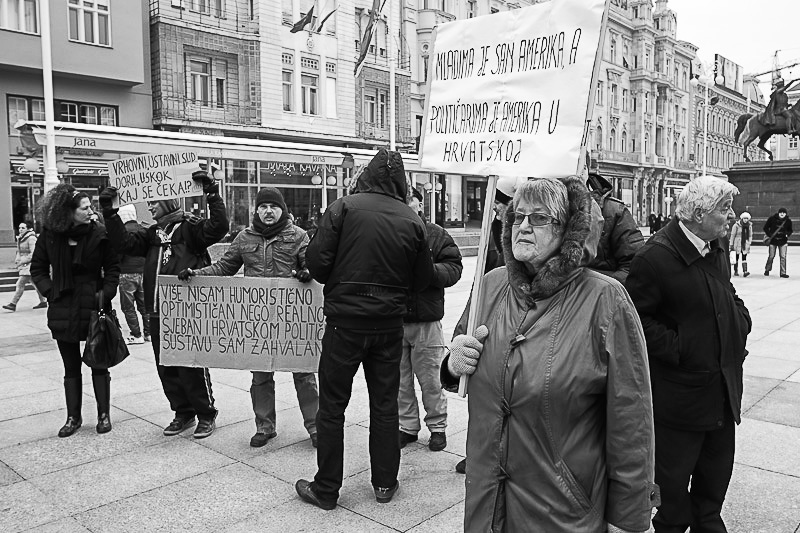
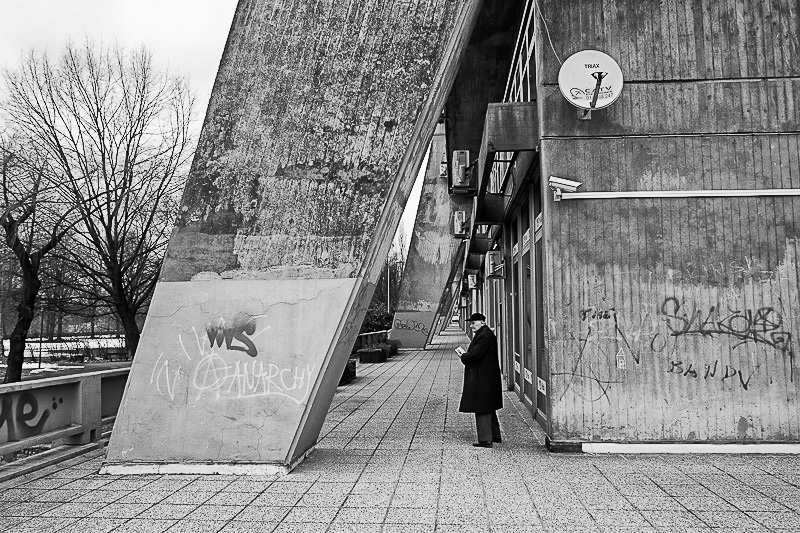
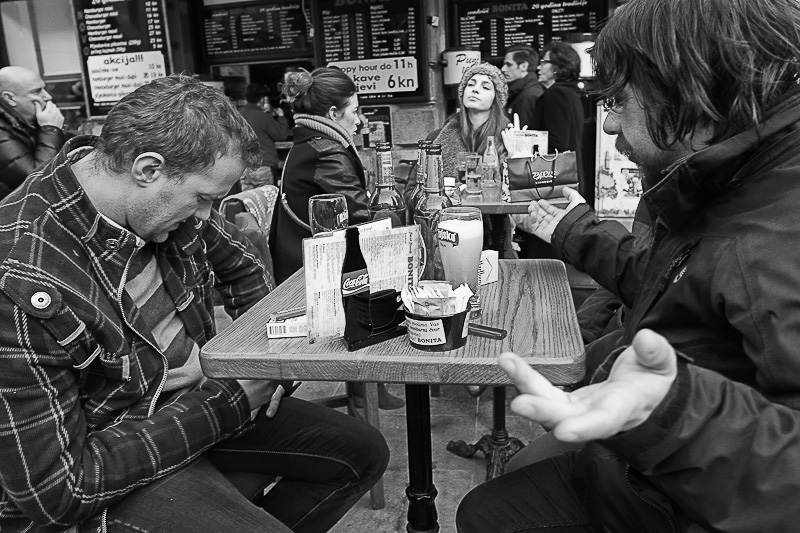
This is far from an isolated case of corruption. In the late 1990’s, then Croatian President Tudman devised an insidious concept that would see “200 families” be given control over all property in Croatia. During this period, influential individuals – with state backing – acquired publicly owned properties and land at bargain discount prices.
Having been robbed of their communal wealth, the ordinary citizens of Croatia were further punished by having these inept and inexperienced new company owners run many organisations into the ground. This lead to an economic depression, resulting in widespread unemployment and pain. To this day, Croatia grapples with extreme unemployment. The nation continues to deal with seemingly endemic corruption, nepotism, and elitism.
These conversations I have been having in Zagreb, with locals all too willing to tell me the truth about their personal lives, and their country, are starting to have an effect. “All my life, I wished I was born in an English-speaking country”. On the outskirts of Zagreb, this definitely wasn’t a normal tourist haunt. I was taken aback, and I saw sadness in her eyes. “Why?”, my companion asked.
“When I was younger, I watched Santa Barbara on television. I loved it. I wanted that life. Anyway, what are you doing here, in this part of Zagreb? Not many tourists come here”. I explained I wanted to take a look at the enormous, brutal, communist-era apartment building across the road. “Oh.” Any confusion she had developed about why we were standing in her world, had just been amplified.
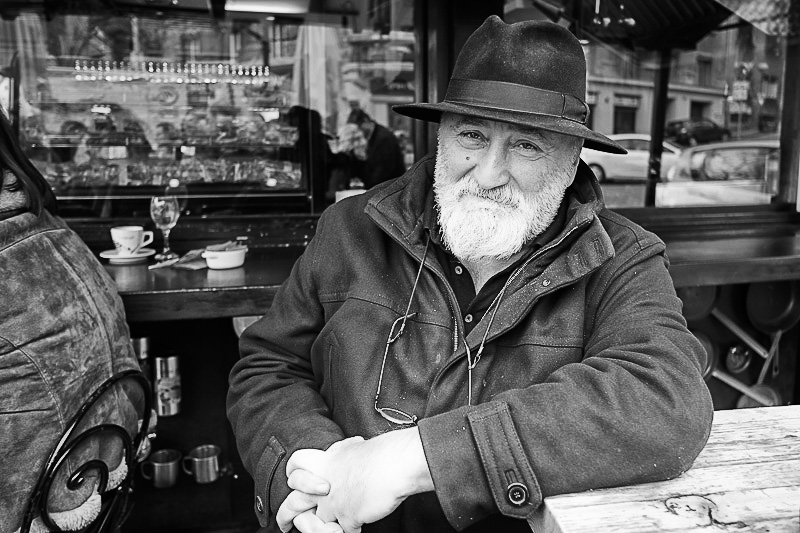
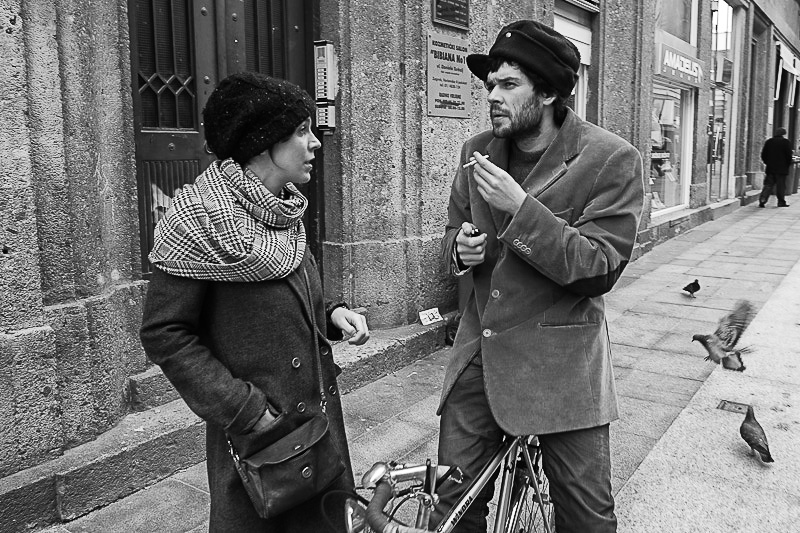
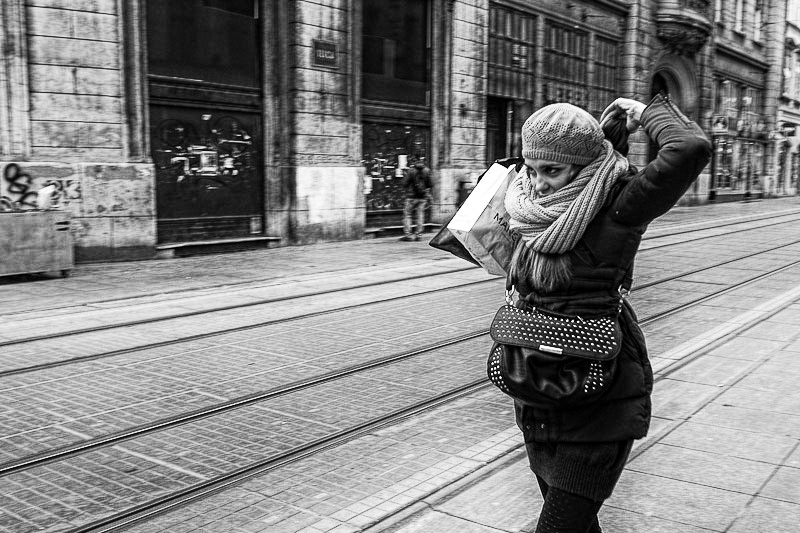
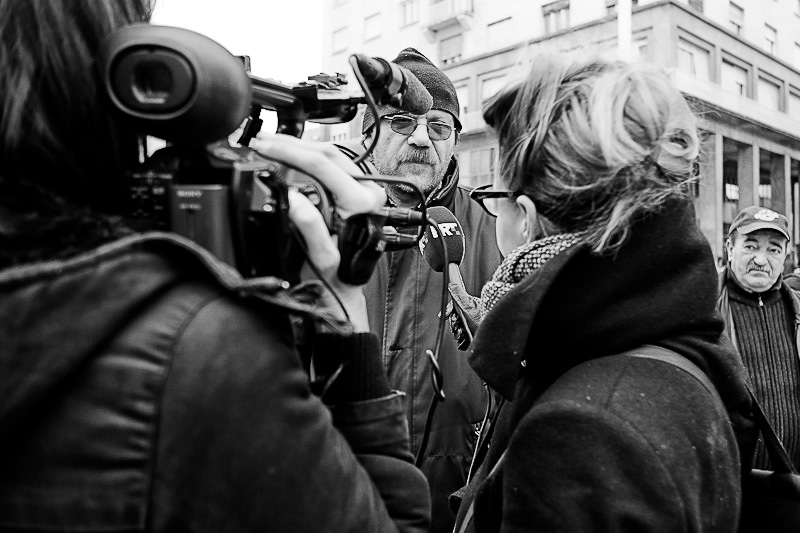
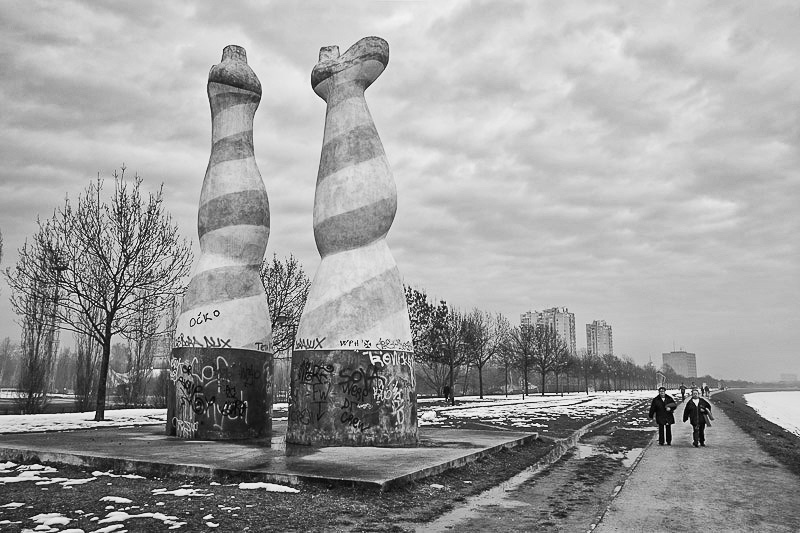
This world, to many people – it’s a harsh, unforgiving place. On the surface, Zagreb is a beautiful city filled with attractive people, a wide variety of interesting architecture, great food, and more museums per square foot than any other city on Earth.
However, it doesn’t take long to get beneath the surface, and see that despite the generally happy disposition there exists real fears and doubts about the future of Croatia. People are decidedly living in the moment, day-to-day. They’re not that interested in dwelling on thoughts about the future.
“I’m OK. I earn 1000 euros per month. Then I pay 350 in tax. I have 650, it is enough. But, I fear for the future of my children.” After two weeks of routine, I had a concept of the prices here in Zagreb, and I know that 650 euros would require some extreme budgeting.
This man was the manager of a cafe, working long hours, to have enough money to pay for his wife, and his two children. “I’ve seen hard times. I can go a day eating just a piece of bread if I have to. I can do it. Maybe for two days.” If somebody knows how to respond to being told things like that, please let me know.
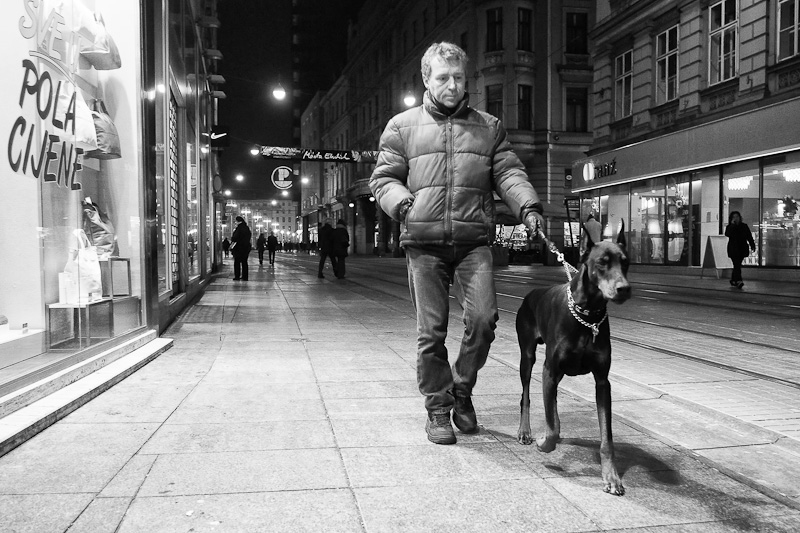
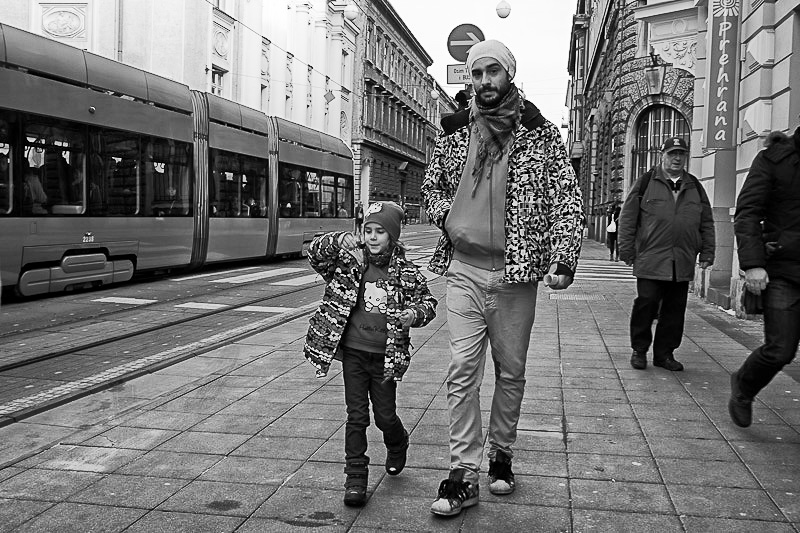
Talking to people on the streets, in the bars and cafes, is how you get to know a place. Without this interaction, you have no chance – at all – of understanding a nation. Taking photos of people on the streets of an urban environment is how I get to know a country. It often starts with a simple question – do you speak English? I explain why I just took a candid photo, they ask me questions about where I am from, and it goes from there.
When you spend a lot of time taking photos of people, you hone your ability to remember faces – even those you have only seen fleetingly. A couple of days ago, I noticed a familiar face. I had seen him a few days before that, sitting at Cafe Bonita. I approached him, let him know I had seen him the other day around the corner, and asked what he was doing with his camera. “I take photos of people on the streets of Zagreb. Fashionable people. I put the photos on the internet, it’s very popular. This is my job.” Obviously, he was smiling.
There is no shortage of attractive and fashionable people out and about in Zagreb. Despite an official unemployment rate of over 20%, the streets are full with cafes where on a sunny day every seat is accounted for. It seems nobody is working – perhaps because the reality is the majority of people aren’t. In paradoxical opposition to the economic issues, Zagreb is one of the most alive small-scale cities I have ever visited. People, are happy. I know, because I have asked this question many times over the last two weeks “are people happy in Croatia?”. Everybody answered – yes. “Not rich, but happy”.
Croatian people have experienced a long history of consistently periodic disruption and upheaval.
With a population seemingly convinced that things will get worse, not better, perhaps it’s just a well-honed national psychological defense mechanism, to not think about the future.
By and large, Croatians remain happy, and get on with life.
Maybe there is something to be said for living in the moment.
Or maybe there isn’t any other real choice.
It’s always a tough one – getting political on what is ostensibly the personal blog of a travelling photographer. However, stories like these deserve to be told.
Nate
PS, for further reading about the current situation of corruption in Croatia, this article was published just a couple of weeks ago: EU should stop funding Croatia’s corrupt networks.
PPS, all of these photos were taken in Zagreb during January and February 2013. The subjects of these photos are not the people I mention in this article, I have respected their privacy.

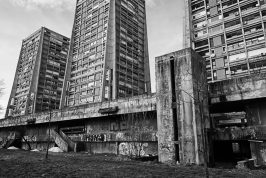

Great update. Your posts just keep getting better and better, both in the expressiveness of the stories told and the images themselves.
Cheers Paul, I really appreciate you saying that.
If a travel blog is about showing and bringing the reader visually and emotionally to the other parts of the world, you’re doing a damn fine job, Nate.
I never had the slightest idea that Croatia is like that. Can’t wait for the coming stories, insights and your experiences.
Thanks Rees – that’s a really great compliment. It’s absolutely my intention to bring the reader to where I am, so glad it worked for you.
Amazing shots Nate! You brought out the heart of Zagreb’s streets through your frames.
On the corruption note, I always felt my country (India) is at the top of the rankings, but good to know there are better performers :)
haha! India does hold its own, I’m sure ;)
I’m enjoying your stories, backed up by great images, well done.
Cheers Mike!
Hi Nate!
I live in Zagreb, in fact I was born here. I found you site a while ago and saw your stories from Iran. So, from time to time, I check what’s new and viola! – photos from Zagreb. I must say that you gave pretty accurate description of atmosphere here. And some great photos! Keep a good work!
Thanks Jadran, coming from someone who lives in Zagreb, it’s good to know I’m on the right track. I absolutely loved Zagreb – I have at least one (maybe two) more Zagreb posts, and I certainly will be back one day.
Nate, i had been traveling around Asia yet and have not been to Europe and your Croatia post is disturbing but as with many countries, including my own, corruption is everywhere. Locals can be the best source of juices gossip in town and this is one told by the people who knew best. Also, the photos you had here are impressive in B&W :)
Sad but true Wends – corruption does seem to be everywhere. And, yes, it’s the locals who know best – it’s great when they’re willing to talk to me (and that they can speak English). As for the photos – B&W is my preferred choice for this sort of photo, I’ll be sticking to it for a while yet I think.
Hey Nate. Sometimes I leave your posts to read in one big swoop when I’m killing time somewhere waiting for the kids. Mostly because they are usually so long! This one did not manage to wait that long today because the photos are just gorgeous and jumped out at me from the email! I echo Paul’s sentiment above – your posts are getting better and better and better!! These are my favourite photos so far.
ha! Yes Tracey, my posts are sometimes long – I have been accused of “going on a bit” once or twice! Thanks for the compliments, I really appreciate it. I’m trying to do more street photography, so stay tuned for future posts with similar photos.
Just love your stuff man, wow! Maybe you should go to Greece?
Cheers mate… I did visit Greece once, in 1999. It’s probably time for a re-visit. I’m not so far from Greece at the moment, and would love to go back. However, being part of the “Schengen Area” means I wouldn’t be allowed in until late April at the earliest. It’s a good idea! Thanks for the suggestion!
Very interesting, but a bit misleading. According to the Corruption Perception Index, Croatia ranks 62 out of 174 nations/territories.
http://www.transparency.org/cpi2012/results
True John, but if you know Nate’s writing style he certainly wasn’t intending the title to be taken literally.
Yes. It was simply me repeating the exact words that various Croatians said to me. Not to be taken literally at all.
Thanks for the link John – not my intention to be misleading. The article I wrote is the stories I was told by Croatians I have met, the title was also what I was told. I didn’t take it literally. I must say, private messages I have received from Croatians since this article was published, are in total agreement about the levels of corruption.
I don’t know a lot about Eastern Europe, in the mid 90s I volunteered with the Canadian Red Cross when the Albanian refugees fled to Canada so much of what I know is coloured by the stories they shared when they weren’t in a trance watching CNN, wondering what had become of their country. I found it so difficult to listen to them because what they shared was so hard to believe as a Canadian girl living in a town of 5000 people.
Even now after all I have seen, particularly in Latin America it’s discomforting to hear people share stories who have never known a remotely fair system.
I’m going to Albania soon Ayngelina, and really looking forward to it (perhaps more than any other country in the Balkans). This really is a widespread problem, as you point out. Europe or Central America – coming from the countries that we were raised in, it’s a very different, and often emotionally wrenching system that some people live day-to-day with.
Come for the photos, stay for the articles. Well done.
ha! Cheers mate, always nice to hear from you.
You appear to have bumped into Robert DeNiro!!
On a serious note, the images complement the ‘grittiness’ of the story really well. Makes me want to visit Zagreb and explore. Thank you.
YES! That’s what I said to him… “do you know Robert DeNiro?” When I told him who DeNiro was, he told me he hadn’t heard of the actor. Then, he told me he was a director, but that he thought he looked like a writer. I sat talking with him for a coffee or two, and then kept watching him – he really did look like DeNiro.
I know three Croatian men who look exactly like DeNiro, with one of them I started to talk in English. DeNiro is truly Croatian type.
Just had another read through this post, and I must admit I’m still thinking about a lot of what has been said here.
It makes you wonder what will happen when Croatia ascends to the EU in July this year. I assume for the average Croatian, not much, although perhaps it will become even harder to live when the country no longer has the ability to control its own desinty financially – then again, with the corruption that exists, perhaps it’s a good thing? So much to consider.
I always find it interesting that when you travel to places where poverty, unemployment, hardship or whatever exist, the people always seem to be happy. I wonder if it’s more a situation of not being happy as such, but rather not being unhappy. A lot of these people have a lot to legitimately complain about, however maybe it’s human nature after a while to just adapt and get on with it. Who knows.
Oh and btw, I just realised the title is “Means Streets” rather than “Mean Streets”. Either it’s a witty pun, referencing the economic means of the citizens of Zagreb, or a typo ;)
Woops – Paul, my reply seemed to have disappeared on this one. Yes, there was a lot of talk about the imminent EU membership – nobody had an opinion on how it would effect them personally. One thing to note, they’re not getting the Euro immediately – so Croatia can maintain it’s own financial destiny in ways that Eurozone countries can’t.
Oh, and PS – it was a typo ;)
Nate, I felt like I was reading a Paul Theroux passage, you are a stellar writer. It seems like the situation in Croatia is dire, I never knew it was like that. And stunning photos…I’d love to pick your brain on photographing people one day.
Cheers mate, really appreciate it. Hope everything is good in DC – when we finally meet, we can drink beer and trade photography tips.
Great post! I met many Croatians during my travels but I guess I met the better off ones who have enough money to travel and who also talk about future… I knew that almost all Eastern European countries struggle with corruption, but I heard from many Eastern Europeans, whose countries are now in EU, that corruption diminished after joining the EU.
Let’s hope so Izy! Croatia is joining the EU in just a few months.
Of course there is something to be said about living in the moment, but how one does it will always be relative. Relative to where they come from, relative to what they’ve been through. The bit about that lady watching Santa Barbara hits real close to home (obviously), and all I can say is get used to it. Similar to Scandinavia, TV is the Balkans is not usually dubbed so not only will you find that people can speak English incredibly well, but also that they are super intune to American culture through TV and movies. At least most of the people I met. It kind of doesn’t matter yet it kind of does.
Ok, now I’m just babbling but I can’t stress enough how stoked I am that you are traveling through this region. YOU. Because lots of travel writers can go and write about how beautiful it is, blah, but you’re one of the few who can truly capture the spirit of a place and have an emotional intelligence that I think many writers out there lack. Fingers crossed you’ll still be there when I finally make it back (maybe late Spring or late Summer) because I don’t think there’s anywhere else in the world more fitting for us to finally meet :)
P.S. Those concrete legs are AWESOME.
Ah, thanks Larissa – you know how to make a guy happy. I can understand the Santa Barbara reference hitting close to home, and perhaps you may not realise that my little home of Perth in Western Australia is not so different from California – just smaller with way less people. So, it impacted me as well. I was kind of speechless when she said it. I’m glad you’ve told me to get used to it – I will!
I would love to meet in this part of the world – how rad would that be! In any case, I think you’re going to enjoy the next couple of posts, hope they will give you some memories, and motivation to get over here.
Oh, and thanks so much for the compliment – you know how I feel about your writing and photos – you’re one of the best out there, so I really appreciate the kind words (as always).
I dated a Croatian for about 6 months – a dark-eyed, dark-souled, angry-poet artist type from the outer-outer burbs of Melbourne. Looking at these pics, it all makes sense. It makes me wonder about genetic memory – he would have been right at home in his native country. It seems all his cynicysm would not have seemed so out of context. Unfortunate he passed before he got to see it.
I like what the other guy said: “Come for the photos, stay for the articles”.
Keep them coming Nate.
Hey Fiona… isn’t it interesting to think about genetic memory? Shame he didn’t get to see his motherland – a place where cynicism goes hand in hand with corruption. Hope all is well, say hi to A for me!
Hi Nate,
Love your work. I’m sure that this question must have been asked of you numerous times before and my apologies if this is so but, how do people respond to you photographing them and what are the implications of posting their images on the web? Thanks and keep up the good work.
Hi Simon – I have never had a serious confrontation. Most people either love it, or have no problem. It’s all about demeanor. As for the implications – it’s different in each country, but in general there is no law about taking a photo of someone in public and using it in a blog post. Check with the local laws on “street photography” in whichever country you’re interested in.
I find it extremely sad what has been happening in Croatia and how the people have suffered.
That’s so cool that’s taking photos opens the door for you to talk with the locals. I’ve never thought about it that way. Great post Nate. Spending a month in Croatia in June. It’s one of the countries I’m looking forward to the most in 2013!
Ah Stephen – from what I understand, June is the best month of the year to be in Croatia, you’ll love it. I’ve thought about returning at that time of the year…we’ll see. And yes, taking photos of strangers is certainly a quick way to get to know a place, it’s one reason I keep doing it.
The story and the photographs you use to tell it are wonderful. I just happened to come across this blog when clicking around the interwebs this morning. I really appreciate reading your perspective on Croata–I was there a few years ago and found it really hard to connect on the whole while I was there (something I had no issues with in Slovenia and Bosnia), but then I did not have a lens through with to figuratively and literally ask questions and dig into the subjects you talk about.
First, I would like to apologize if my written English is bed.
I live in Zagreb and I was borne in Bosnia. The photos and the post is greatly written, I must say that. But still I am a bit said because of the hard impression You had of Zagreb and Croatia. The corruption surly did mark the last two decades of Croatia, but I am sure that you would not have heard these kind of stories if you would have spoken to the people in the peek of croatian corruption. The thing is that the last few years have been marked by the fight against corruption, the people are now much more awere of this problem and Croatia is changing. But the easy thing to do is to arrest the former prime minister, a couple of ministers and a lot of company directors. The problem is to change the evry day “average guy” corruption and nepotism. I am sorry that you had a bit pessimistic impression. It is not the truth, the way I see it. On the other hand, you would have seen much harder living if you would have left Zagreb (the people in Zagreb are one of the richest in Croatia). Becouse of my profession, I have visited a lot of rural parts of Croatia and some smaller city’s. The future there is looking even darker than in the capital, but still people are not giving up and I (want to) believe that things are getting better. Economic problems in Croatia are big and deep, but I don’t think that people are living “day by day” in this “giving up” stile.
My comment is already to long. I just wanted to say that I liked this post and I am going to read some more but I wanted to give one bit more optimistic look and say that here in Croatia we have not given anything up. Just the oposite ;)
Hi Gargamel, thank you for giving me and my readers a deeper understanding.
One point – I see nothing but optimism in Croatia, and I understand perfectly that people haven’t given up – as you say, quite the opposite.
Hi Nate!
Sorry to say but your title is stupid and missleading!
Mean Streets of Zagreb, Croatia – Most Corrupt Nation in The World???
Zagreb is one of the most beautiful,cleanest and safest central/eastern European capitals with some of the most beautiful girls on planet(and i traveled the world).
Yeah,we have fair share of corruption problems but we are nowhere near most corrupt nation in the world!
Our ex all mighty prime minister(and not only him) is standing the trial,we have a new government so things are getting much better(at least corruption wise).
Do you realize we’ve been through war?Do you know what war brings?
Croatian people in general are Mediteranien people who like to work little,enjoy a lot and complain a lot.
Its the mentality.
Your articl is not bad,it gives a certain angle and thats your choice but,please,get to know your subjects better if you wanna be taken seriously as a journalist.
Your pictures are great,though!
Best regards
Luka
Zagreb
Thank you Luka. Please remember, this is a personal travel blog, featuring the stories and photos of people I talk to and places I see. As for the title – these words were the exact words spoken to me by two different Croatian men. It is not to be taken literally, it is just a quote – direct from the people of Croatia. This was made clear in the article. And these people have a right to say what they would like to say about there own country – just as you do.
I agree with you about Zagreb – I love it. If you read my other articles on Zagreb, you will see how much I enjoyed my time there – and I hope to return.
By the way – of course I realise you have been through war(s), and what that brings.
Thanks for stopping by, and adding your opinion. I very much appreciate it.
Yo, Nate. I lived right across from Super-Andrija in late 1960-s, early 1970-s when I was a little kid (at Siget 21 F). To me it looked like a stranded space-ship from a sci-fi movie. I think that both socialist and capitalist countries underwent a lunatic period of post-war era fascinated with massive, ugly, modernist architecture (think ‘projects’ in NYC). Super-Andrija is not the biggest. You should have gone to Dugave and take a picture of Mamutica. And take more pictures of the phenomenal graffiti everywhere. New York got scrubbed clean of them. Zagreb still has them. I even found some I sprayed 30 years ago, lol.
While corrupt, Croatia is not the most corrupt nation in the world. It doesn’t even come in top 20 (http://www.infoplease.com/world/statistics/most-corrupt-countries.html). And if New York state is a country, it could compete for top spots: http://www.nytimes.com/2013/04/03/nyregion/with-senator-smiths-arrest-yet-another-corruption-case-for-albany.html?_r=0
However, you were right to convey the feeling of tension, dissatisfaction, anger – the transformation of society during the wars of Yugoslav succession from public to private ownership was essentially a great plunder by politically well connected (but we do have to bear in mind that every capitalist society is established on that initial plunder by a group of well connected individuals). That left a lot of people dispossessed. And there is certain almost small-town meanness citizens of Zagreb are capable off towards newcomers and towards each other. That got worse with the feelings of injustice and inequality.
This is likely to be exacerbated and not mitigated by the ascension to EU, and ill-planned acceptance of Euro currency. Croatia has negative economic growth and unemployment rate nearly three times the US. Nearly 90% of its financial sector is owned by foreign banks. It has second largest VAT on the planet (25% – any US governor that attempts that would be lynched), and the government still cannot balance its budget, and the country plunges further in unsustainable debt, while most of the surviving economy is essentially businesses importing EU goods and/or servicing foreign visitors.
People do take the situation with a large dose of humor, true, but the reality can hardly leave people happy. Pair of Levi’s jeans that I buy in NYC for $29, I found (but not bought, of course) at Jelacic Square for $120. Insanity. But beer and – particularly – cigarettes are FAR cheaper. Go figure.
Hey Ivo, thanks for comment, I really appreciate it. With the graffiti – funny, I have mentioned a few times in passing that the Balkans reminds me of NYC from decades gone by. Personally, I’m a fan, although I know a lot of people aren’t. I will get back to Zagreb, and check out Mamutica – as well as pay extra attention to the graf. Maybe I can do an upcoming article on the artwork that remains. Loving the fact that trains are still covered!
I’m really learning a lot about this part of the world – when I arrived a few months ago, I honestly thought I would struggle to get any insight at all, it’s such a complicated history. However, from talking to people on the ground, and from comments like yours, I’m starting to get a picture.
PS, as for the corruption – yes, I know Croatia is not the worst, and I agree – there is corruption everywhere, the US in many ways is among the baddest of them all. As for banking – I was told (I’m not 100% certain), that there are no Croatian owned banks in Zagreb. It’s a messy situation for sure.
Your pictures are awesome. My husband is from Croatia, Brac. I never knew it was that bad there until a few years ago. My husband has a house there. He had a family member go to a corrupt judge and took his house. It has been in court for the past 5 years. We just received word it is legally his again. Apparently his property was just one of many the judge allowed other people to steal. So sad.
Great post. I am going to Croatia next week… I wrote in because I would love to know more photo information, ISO, shutter, aperture. These are wonderful photos. Thanks!
Hi! Great article even though it gave me chills (in a negative way).
I was born in Zagreb in 1983 and lived there since 5 years ago when I moved to Italy (not because I wanted to emigrate because of economics and other problems, but because I got married to an Italian and it was just our personal decision).
I agree that there is corruption and it is for sure the one of the worst things about Croatia in general.
But I have to say that growing up in Zagreb I always felt so happy and proud I lived there. When I traveled Europe as a student I was so proud saying people I met that I was from Croatia and when I moved to Italy I have noticed I’ve been somehow “put” in the “basket” of east European ex communist population with all stereotypes that it brings and I felt confused because they did not apply to me and my life in Zagreb, which I never saw as an ex-socialistic city. The only evidence of socialism are indeed the buildings, but when it comes to people, I would rather use the colorful “picture” than the black and white one.
I understand that you spoke to people and some of them said they wished they were born in english speaking country, even I wanted that as a kid, but only because I was in love with that actor what’s-his-name and I wanted to live close to him. Even now, after I’ve visited New York for example I say how would it be great too live there but then again I realize how it was great to grow up in Zagreb.
I appreciate your comments and observations but I am sad to read about the city I love in such a gray tone. We Croatians have our difficulties and maybe it seems like we have lost hopes for a better future but it is because we have actually lost hope in our politicians and politics in general, not the future itself. Because of privatization in the 90s we feel betrayed just like anybody would feel in the same situation, that’s it! Because of the economy crisis we feel depressed but I felt the same depression among my Italian friends.
What I love about my friends and Croatian people in general is that we don’t loose spirit in hard times and we have fun, we smile and know how to enjoy anyway.
Hope to see you in Zagreb again :))
Hold your horses! Its not that simple. I am 37 years old, I live in building Super Andrija from day I was born. Until 1950’s almost 50 percent people didnt know how to read, until 1990 only 5 percent people didnt know how to read. Thats communism! Those ‘brutal’ building are wonderful achievement of architecture! Almost all people poor from villages came to city to work and live, thats evolution on balkans! People got flats for free, free health help, free school and college etc….! Problem is that croatians never got denacification program like germans, they think today that hitler is good, their puppet state ‘independent croatia NDH’ was genocide country, their church genocide too, pushing that policy even today thats why we had civil war in yugoslavia in 1991. Thats the real problem, people are teached from when they are born that there is no truth just scam etc… and hitler. They tech childern how to hate, how to cheat. But, in so called croatia, there are other people like me not only croats, former yugoslavs. Yugoslavia and communism was most positive era of todays croatia. No religion, no nationalism, only cosmopolitism, love, brotherhood, industry, etc… but 60 percent of croats were for hitler in ww2, and came to power in 1991, war started in 6 months. And now its all GREY atmosphere. Thats the only truth. About their genocides in another conaversation.
brutalism is underrated :) Greetings from Zagreb!